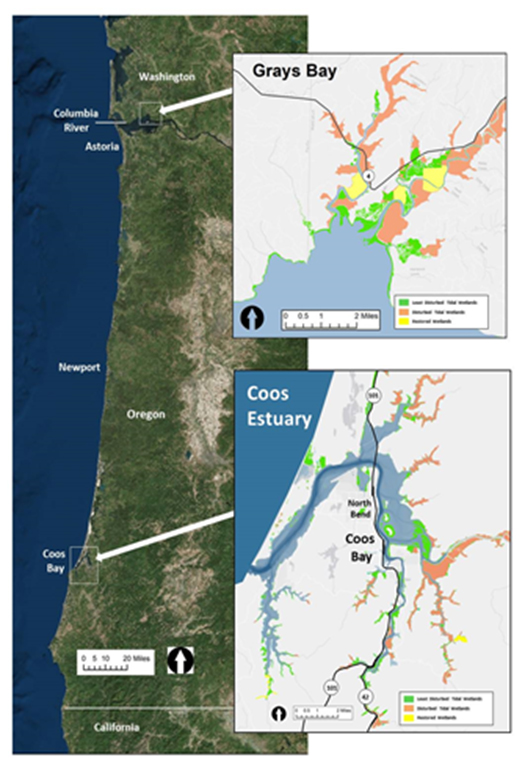We will evaluate how restored and natural coastal wetlands buffer flooding impacts in Coos Bay (Oregon) and Grays Bay (Washington).
Why We Care
Increasing flood and salinity levels from sea-level rise threaten the ecosystem services that wetlands can provide in the Pacific Northwest. Coastal wetlands provide flood protection, capture carbon, and offer benefits to fisheries. Restored wetlands can maintain and enhance these services throughout the region, especially in light of changing ocean and coastal watershed conditions. This project will address how least-disturbed and restored tidal marshes and forested swamps can provide coastal protection and blue carbon services under a range of future restoration and sea-level rise scenarios.

What We Are Doing
Drawing on local expertise from the project team and regional end users, we will use a hydrodynamic model to assess how restored and natural coastal wetlands buffer flooding impacts during high water events in the Pacific Northwest in the Coos River estuary and Grays Bay on the lower Columbia River. The team will also evaluate restored and natural sites for future changes in elevation using a model of wetland change (Wetland Accretion Rate Model for Ecosystem Resilience [WARMER]). Using existing data sets and new field data, researchers will assess changes in greenhouse gas and carbon sequestration rates (blue carbon) in tidal marshes and forested swamps.
These data will be used to create an assessment of how coastal wetland services are expected to change in the future. Project findings will help land managers, policymakers, scientists, and the public plan for coastal climate change and develop management actions that sustain ecosystem services in a changing future.
Benefits of Our Work
We will analyze data sets on coastal protection, blue carbon function, and future projections of wetland elevation to determine how coastal wetland services are expected to change in the future. The outputs and potential outcomes will be considered across a range of climate change and restoration scenarios. The outputs will help land managers, policymakers, scientists, and the public plan for coastal climate change and develop management actions that sustain lasting ecosystem services.
This project is led by Oregon State University’s Department of Fisheries and Wildlife, and is funded through the NCCOS Ecological Effects of Sea Level Rise Program. Project partners include the Institute for Applied Ecology, the U.S. Department of Energy’s Pacific Northwest National Laboratory, and the University of Oregon’s Institute of Ecology and Evolution and Department of Earth Sciences.
